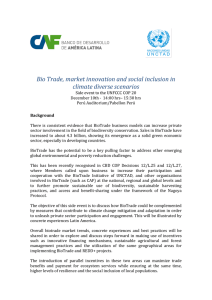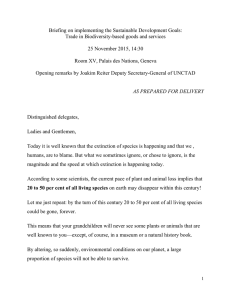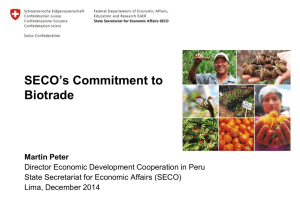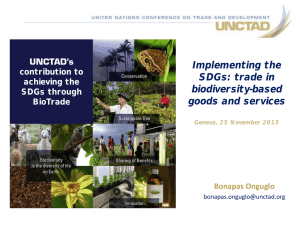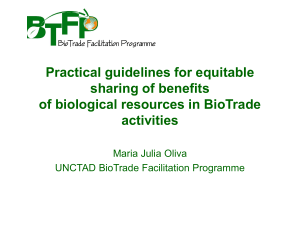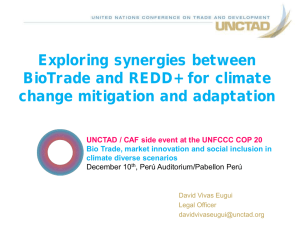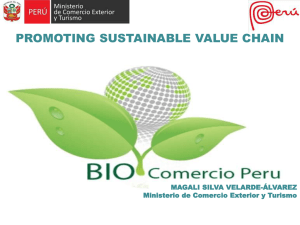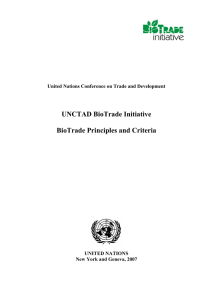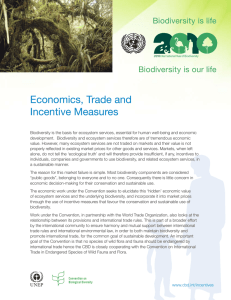THE BIOTRADE INITIATIVE Tackling vulnerabilities, building resilience GLOBAL CONTEXT
advertisement
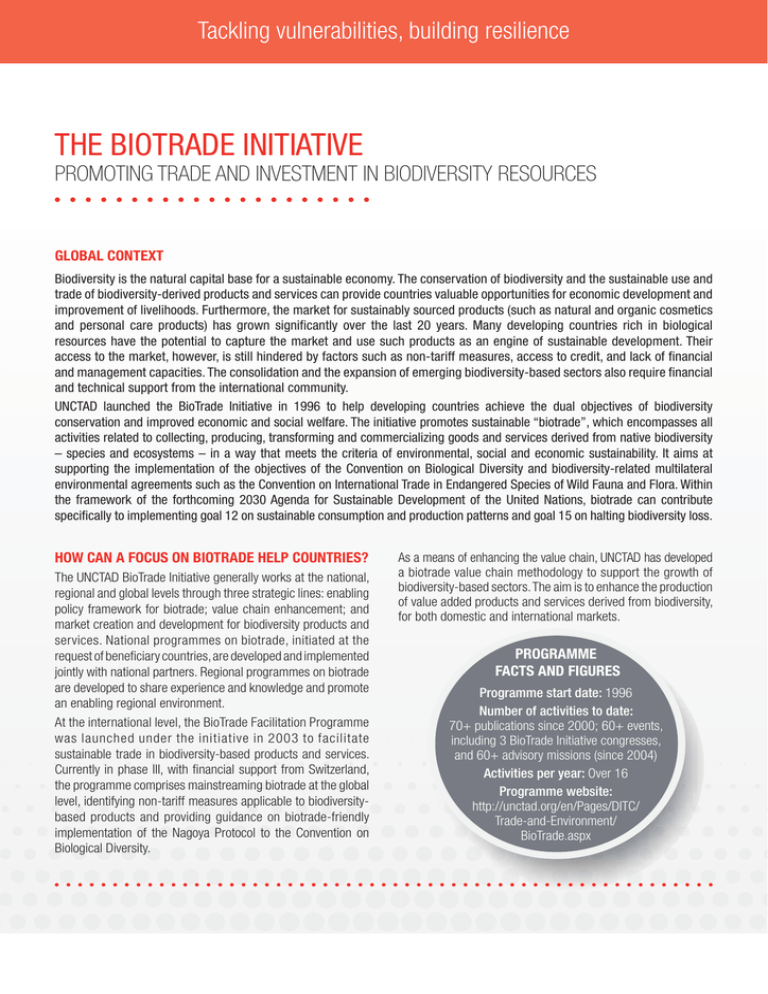
Tackling vulnerabilities, building resilience THE BIOTRADE INITIATIVE PROMOTING TRADE AND INVESTMENT IN BIODIVERSITY RESOURCES GLOBAL CONTEXT Biodiversity is the natural capital base for a sustainable economy. The conservation of biodiversity and the sustainable use and trade of biodiversity-derived products and services can provide countries valuable opportunities for economic development and improvement of livelihoods. Furthermore, the market for sustainably sourced products (such as natural and organic cosmetics and personal care products) has grown significantly over the last 20 years. Many developing countries rich in biological resources have the potential to capture the market and use such products as an engine of sustainable development. Their access to the market, however, is still hindered by factors such as non-tariff measures, access to credit, and lack of financial and management capacities. The consolidation and the expansion of emerging biodiversity-based sectors also require financial and technical support from the international community. UNCTAD launched the BioTrade Initiative in 1996 to help developing countries achieve the dual objectives of biodiversity conservation and improved economic and social welfare. The initiative promotes sustainable “biotrade”, which encompasses all activities related to collecting, producing, transforming and commercializing goods and services derived from native biodiversity – species and ecosystems – in a way that meets the criteria of environmental, social and economic sustainability. It aims at supporting the implementation of the objectives of the Convention on Biological Diversity and biodiversity-related multilateral environmental agreements such as the Convention on International Trade in Endangered Species of Wild Fauna and Flora. Within the framework of the forthcoming 2030 Agenda for Sustainable Development of the United Nations, biotrade can contribute specifically to implementing goal 12 on sustainable consumption and production patterns and goal 15 on halting biodiversity loss. HOW CAN A FOCUS ON BIOTRADE HELP COUNTRIES? The UNCTAD BioTrade Initiative generally works at the national, regional and global levels through three strategic lines: enabling policy framework for biotrade; value chain enhancement; and market creation and development for biodiversity products and services. National programmes on biotrade, initiated at the request of beneficiary countries, are developed and implemented jointly with national partners. Regional programmes on biotrade are developed to share experience and knowledge and promote an enabling regional environment. "UUIFJOUFSOBUJPOBMMFWFMUIF#JP5SBEF'BDJMJUBUJPO1SPHSBNNF was launched under the initiative in 2003 to facilitate sustainable trade in biodiversity-based products and services. Currently in phase III, with financial support from Switzerland, the programme comprises mainstreaming biotrade at the global level, identifying non-tariff measures applicable to biodiversitybased products and providing guidance on biotrade-friendly implementation of the Nagoya Protocol to the Convention on Biological Diversity. As a means of enhancing the value chain, UNCTAD has developed a biotrade value chain methodology to support the growth of biodiversity-based sectors. The aim is to enhance the production of value added products and services derived from biodiversity, for both domestic and international markets. PROGRAMME FACTS AND FIGURES Programme start date: 1996 Number of activities to date: 70+ publications since 2000; 60+ events, including 3 BioTrade Initiative congresses, and 60+ advisory missions (since 2004) Activities per year: Over 16 Programme website: http://unctad.org/en/Pages/DITC/ Trade-and-Environment/ BioTrade.aspx Biotrade value chain methodology Identification of sectors with potential Selection of value chains Participatory assessment of the value chain Formulation of the sector strategy Implementation List of products and services Selection of matrices Gathering of information Strategic lines of work Implementation of the strategy Product groups Strategic analysis Mapping Formulating a workplan of activities Gap analysis Validation of the strategy Prioritizing Analysis of problems and solutions Prioritizing solutions RESULTS AND IMPACT AT A GLANCE Results in-depth Since the launch of the BioTrade Initiative, progress has been achieved by private actors and partners in embracing biotrade concepts and principles. Over 20 developing countries in Africa, Asia and Latin America have been implementing the BioTrade Initiative. Currently, there are eight national programmes in Africa, Asia and Latin America under implementation, and two regional programmes in Latin America. The Amazon BioTrade Programme covers eight Amazon-basin countries, while the Andean BioTrade Programme benefits four of the region’s countries. The products and services traded by beneficiary countries cover sectors such as personal care, food, pharmaceuticals, fashion, ornamental flora and fauna, handicrafts, textiles and OBUVSBMýCSFTBOETVTUBJOBCMFUPVSJTN'PSFYBNQMFUISPVHI the BioTrade Initiative: tActivities in biotrade have benefited approximately 30,000 farmers, collectors, breeders, hunters and producers, creating jobs and generating additional income opportunities for rural and marginal communities as well as other actors in the value chain. tMore than 19 million hectares of land are sustainably managed by beneficiary organizations working in biotrade, promoting conservation and sustainable use of biodiversity. tSales revenues of biotrade beneficiary organizations, working with small and medium-sized enterprises and multinational DPNQBOJFTBNPVOUFEUP64CJMMJPOJOoBOJODSFBTF of 126 per cent compared with US$2.3 billion in 2010. Biotrade and peace-building in Indonesia and Colombia Biotrade is being used in post-conflict reintegration and recovery programmes as an approach to promote sustainable livelihoods. In Aceh Selatan, Indonesia, where nutmeg production is an important economic activity and a major source of livelihood, this native spice was successfully promoted as a biotrade commodity under the UNCTAD/United Nations Development Programme pilot project on a gender-responsive reintegration approach to reintegration and peace stabilization. In Colombia, biotrade has been increasingly considered as a key tool that can support the reintegration of ex-combatants and displaced people. Initiatives have been funded by the Presidential Agency of International Cooperation, in coordination with the Ministry of Environment and Sustainable Development and other biotrade partners. DONORS/ FUNDING SOURCE Current: Switzerland (State Secretariat for Economic Affairs (SECO)) Past: Denmark, the Netherlands, Norway, Spain, United Nations 'PVOEBUJPO6OJUFE/BUJPOT 'VOEGPS*OUFSOBUJPOBM Partnerships
